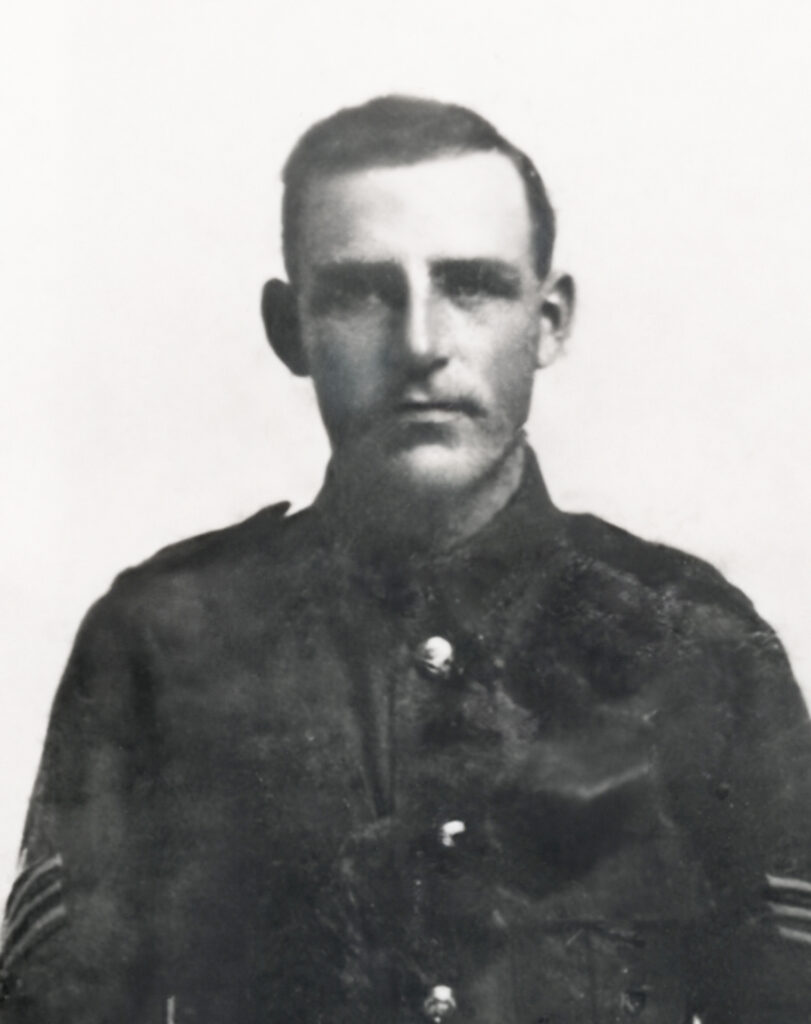

I was extremely fortunate to be able to attend the 2015 commemoration of the centenary of the Gallipoli Landings and share this “experience of a lifetime” with my Daughter, Robyn Maathuis and Son, David.
Our pilgrimage to find more about our Grandfather’s participation on the European and Middle East Fronts of World War 1 generated a blend of emotions never experienced before by any of us, nor likely to be experienced at this level ever again in our lifetimes.
We set out with the goal of finding more about Grandfather and Great Grandfather, who had served at Gallipoli, with Egyptian EF and on the Western Front. He died 22 July 1922 following his repatriation to New Zealand, “Death due to War Service”, leaving a Widow with a young family of 5. The eldest was my father, William John Vine, who at the time was 8 years of age and the youngest, Eileen was to be born 7 months after his death.
However from the time of our arrival in Turkey we were continually changing the script. It was 15 years since my last visit to Gallipoli for ANZAC Day. At that time the atmosphere was dominated by friendly Anzac rivalry, perhaps more of a celebration than a commemoration. On this occasion there was a greater presence of Turks and the event was raised to a tripartite assembly with the common theme of recognising that in the history of all three countries each can point to the experiences at Gallipoli as defining .
Having the company of my 2 children, 53 and 51 years of age, was in itself the experience of a lifetime as our eyes were opened to a Nation with passion and patriotism beyond any we had ever contemplated. The emotions that surfaced repeatedly went far beyond those which are so delightedly aroused at family gatherings and heightened our senses of family, bond and loyalty. It became extremely emotional to reflect that my Dad never had the opportunity to bond with his Dad in this way.
“Founding of the nation” is an oft heard sentiment when speaking of Gallipoli. I now appreciate that this is not just a cliché but a line and truism of substance. The Gallipoli experience was at the forefront of the sense of nationhood developed in all three of our countries, Australia, New Zealand and Turkey. In fact if it were not for Gallipoli and Churchill’s unfulfilled strategy to force the Ottoman Empire out of the war and to open a supply route to Russia through the Dardenelles and the Black Sea, Turkey most probably would not be the nation and people it so proudly is today.
We hear this repeatedly expressed about the two ANZAC nations but my feeling now is that it applies at a very much higher level to our friends in Turkey whose nationhood dates from 1923 under the initiative of its first leader Mustafa Kemal Atatürk.
One cannot escape the impassioned pride and patriotism of the Turkish people. As a member of the Fez Travel ANZAC Major Tour Group (Bus 03) this was brought home to me by Ahmet Saglam our Guide. I guess Ahmet was around 30 years of age. He had graduated with a degree in Tourism. His pride in his country was openly expressed by replacing the word “Turkey” with “my Country”, not once, but on every occasion, and there were many, when he made reference to his Homeland.
Saturday 25 April 2015 was the day for New Zealand and Australia to occupy the Peninsula for the commemoration ceremonies. The following day on the Peninsula was most positively Turkey’s Day with its citizens dominating the number of visitors. Quite possibly this was a normal Sunday on the Peninsula with the Turks paying their respects at the many Turkish Memorials. On this day our group returned to the Peninsula to visit the original trenches and tunnels, Anzac Cove, Lone Pine Australian Memorial, Chunuk Bair New Zealand Memorial, Johnson’s Jolly and the Nek. Along the way we visited the 57th Ottoman Infantry Regiment Memorial . On arrival a group of uniformed school children were occupying the centre stage and performing with song and recitals. They were followed by a group of women in ethnic dress, again singing and reciting. The third we observed was the laying of a wreath by a group about 60 in number of the Anatolian Tigers Motorcycle Club.
Christopher Pugsley, a former New Zealand Infantry Officer who is an authority on New Zealanders at war observed in his Chapter “Galllipoli Revisited” that ” Turkish mythology encompasses the Anzacs in a very different way to the realities of 1915. Today we are friends who once were enemies, but more and more today it is painted as if it was always this way.” Our mingling with Turks at Gallipoli and beyond certainly confirmed their friendship and open interest in Anzacs. My RSA Poppy was indeed an attraction to people wishing to converse, or to point out that they knew its significance and exactly what it meant.
This and other scenes with displays of patriotism can be understood when one learns that the Turkish Government has directed that every Turkish child shall visit the Peninsula during their school years.
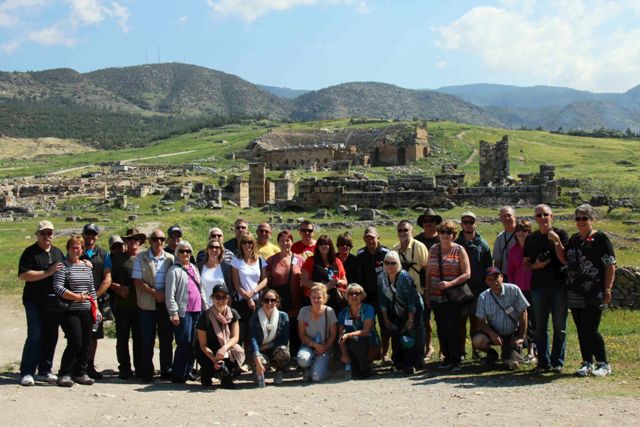
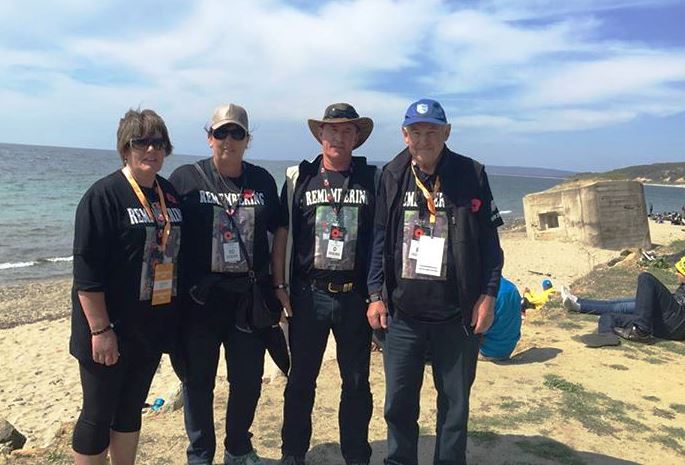
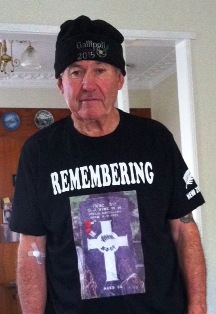
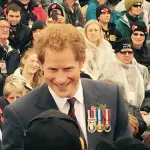
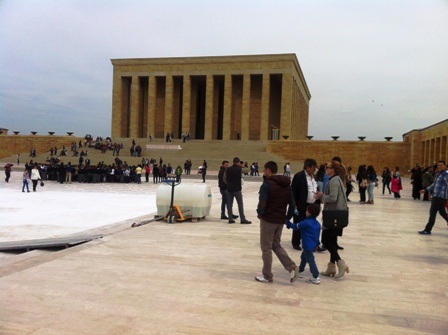
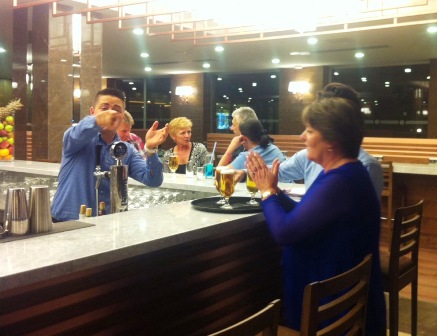
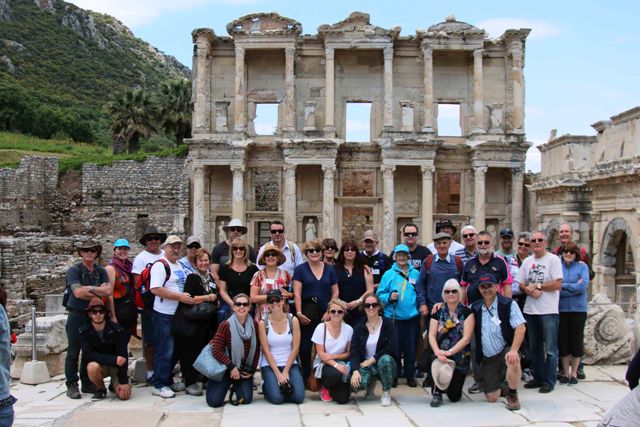
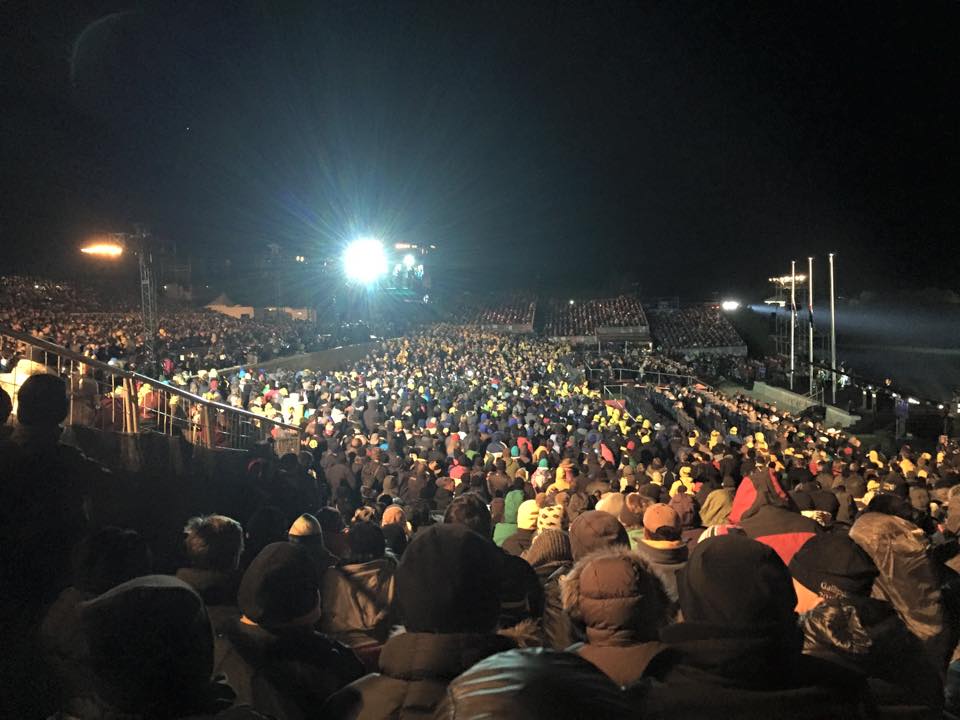
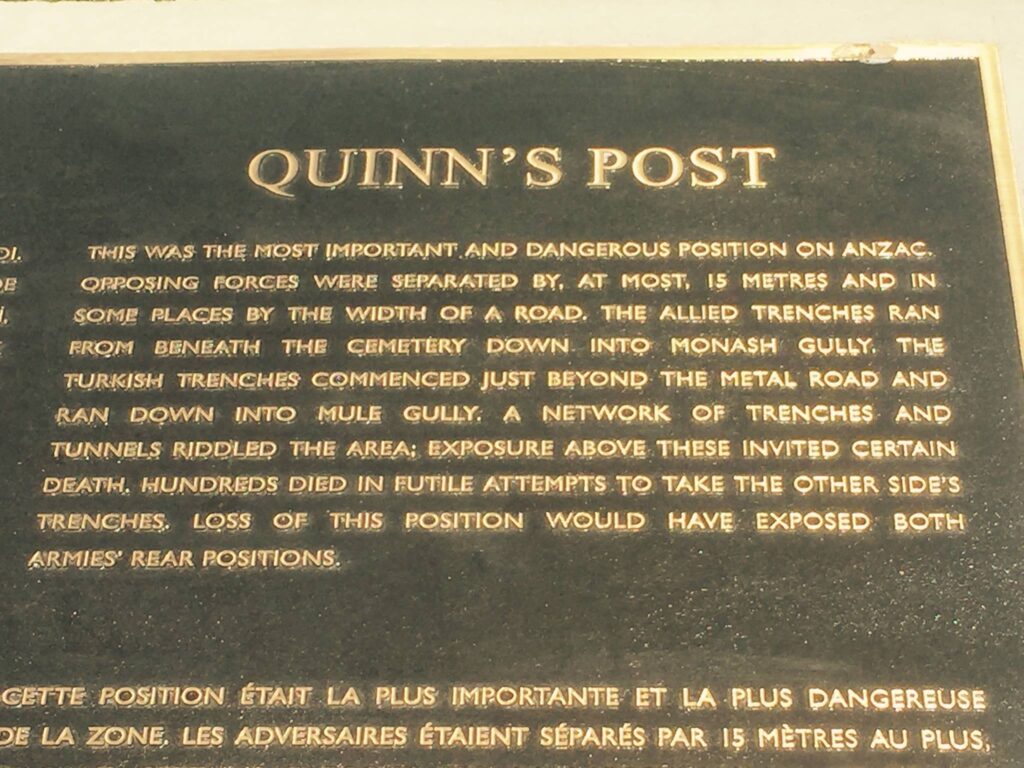
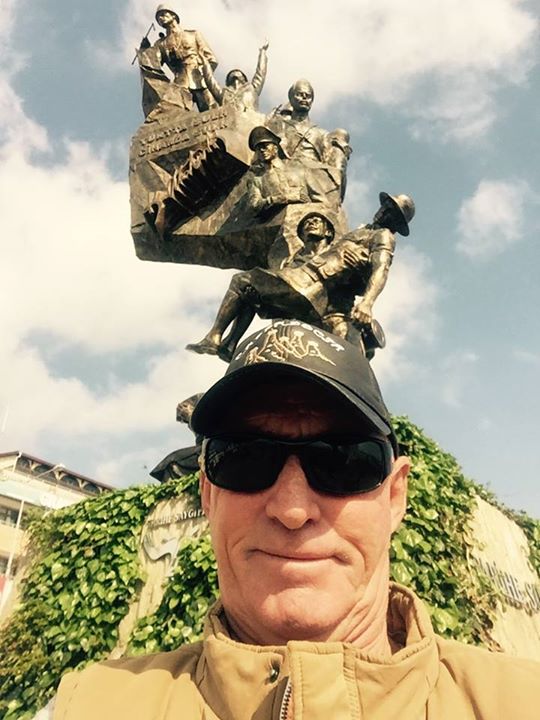
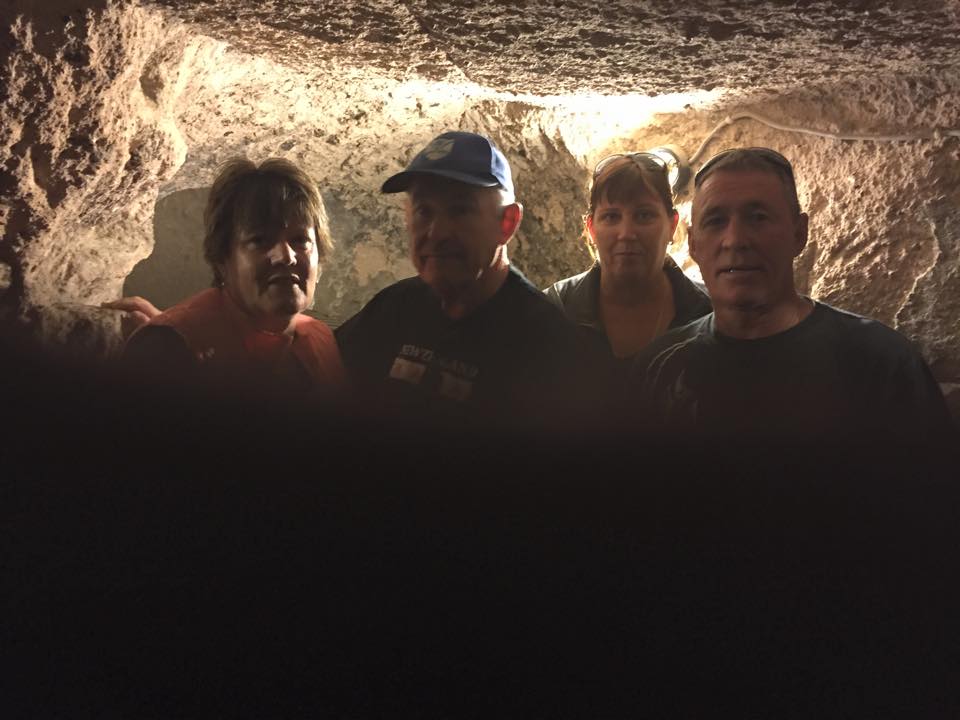
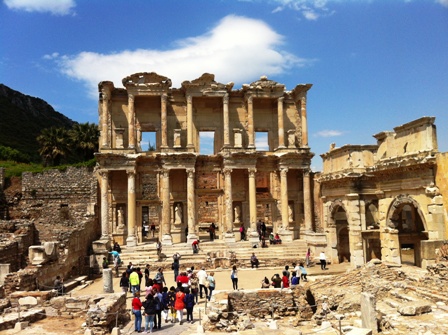
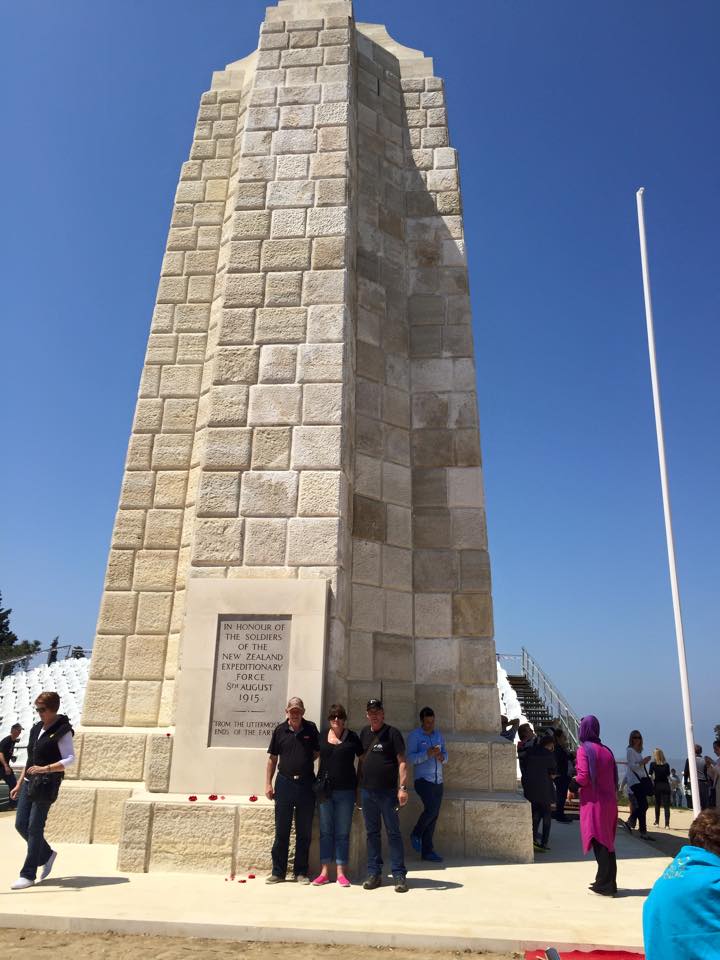
Coming up to Anzac Day and our visit to the Peninsula my thoughts on many occasions turned to the impact on families of those who were involved in the landings. Poignant moments occurred when visiting Cemeteries and averaging the ages of those who died. Leading up to Anzac Day the media, and this is not a criticism, carried a feast of items around the young ages of the enlisted. One could have gained the impression that most were of a very young age, having falsified their enlistment forms or devised some other means of being accepted. Quite to the contrary, I came up with an average of just over 30 years of age. Many of these would have left dependent families who would have been further distressed in the years of the Great Depression. Our family was one of these, with my father becoming a bread-winner at age eight.
Further emotions were stirred on our tour circumnavigating the Western half of Turkey, visiting Ankara, Cappadocia, Goreme Underground City, Konya and the Sultan Hani, Caravansary, Pamuk Kale, the ruins of Hierapolis, the Acropolis of Pergamum and Troy. Historians generally agree that the first Turkic people lived in a region extending from Central Asia to Siberia. Historically they were established after the 6th century BCE. The earliest separate Turkic peoples appeared on the peripheries of the late Xion gnu confederation about 200 B.C (contemporaneous with the Chinese Han Dynasty). The first mention of Turks was in a Chinese text that mentioned trade of Turk tribes with the Sogdians along the Silk Road. with the arrival of Turkish tribes to confront the Byzantine empire in the 11th century AD. Prior to that Anatolia linking Asia and Europe, has a long and distinguished record as a centre of civilization – from one of the world’s first towns (Catal Huyuk), through the successive periods of Hittites and Trojans, Ionians and Lydians, Romans and Byzantines. Here we were treading the soil of civilisations dating back thousands of years before the arrival of the Māori in Aotearoa!
One of the highlights of our visits to Istanbul, before and after the Anzac Commemorations, was to experience the thrills of moving by road. The frenetic pace and risk taking was mind-blowing. Yet of the thousands of vehicles we saw on the streets of Istanbul I spotted only 4 with dings. In comparison to Auckland there were far more vehicles but flow was of a far greater pace. My theory is that with a huge number of motor vehicles, pedestrians and hand pulled barrows competing for limited space, risk taking has become “cultural”. Distancing between road users has been reduced to an absolute minimum – down to around 2 to 3 centimetres. We were continually astonished that there were no collisions. Another thing, all police and emergency vehicles had their sirens and flashing lights in constant use. Unlike here in New Zealand, this prompted traffic to speed up, often well above the speed limits, which never seemed to be observed. It was obvious that the major imperative was to keep traffic moving. As a result drivers had developed skills to meet the demands of what we would see as overloaded grid-locked road systems.
Turkish food has since my first trip to Turkey in 1999 been a favourite. Visits to restaurant and cafe areas in Istanbul is always a challenge as each restaurant has better to offer than the other 30 or so sharing the small narrow street – that is according to the owner who becomes the challenge of a lifetime should you perilously meet his eye. As Ahmet our guide said, if that happens you are in “big trouble”.
Food and liquor service could not be faulted. This led to one of the most humorous incidents of our trip. We were staying at a Ramada establishment that had opened the day before our stay. Everything was nice and new and impeccably clean. Many of the staff were also rather new to their jobs, but eager to please. A group of us settled into the bar, as you do, for a little conviviality and were descended upon by Cedric to gain our patronage and perhaps tips if his service called for same. The first round of beers arrived, all rather flat and with no sign whatsoever of a head. Daughter Robyn, who is a Publican, attempted a rescue by tutoring all bar staff on how to pour an Ale. The next round was delivered and although you could see there was a head, it was of minimal proportions. We observed this to Cedric who retired to practice further with the pouring function. After a little while he returned with what he described as “a cup of head” from which he spooned a measure on to our glasses. Service bar none! Another description would be “a head chaser”.

I should not overlook expressing a huge vote of thanks to the New Zealand Gallipoli 2015 organisation. One could not find one criticism of the planning and management of the Services at Gallipoli on Anzac Day. This is big when you think of the challenges of selecting a cross-section of Kiwis to issue attendance passes from among far more applicants than available places, and the logistics of getting those successful applicants to the ceremony locations on the Peninsula; a job extremely well done and something for those involved to feel proud of.
I particularly enjoyed the release of emotions and personal pressures at the time of withdrawal from the Peninsula motivated by the actions of members of the Defence Force contingent and the 25 Youth Ambassadors . The loading of the coaches to carry off over 10,000 people could have been particularly stressing for some in having to wait over 3 hours for their bus to arrive. This was after having to endure the lengthy, cold and at times claustrophobic conditions at the ceremony locations (Anzac Cove, Lone Pine and Chunuk Bair), all exacerbated by, for many, up to 36 sleepless hours. The “distress” was lightened with the Service people and the New Zealand Youth Ambassadors leading a cheer group acknowledging the arrival of each coach and dispensing high fives to each of the relieved passengers. Good one Guys!
Finally, many thanks to Fez Travel, its Guide, Ahmet, and skilled coach driver for making our tour of Turkey and Anzac Day attendance on the Gallipoli Peninsula so informative, comfortable and convivial. Your actions and planning allowed us to meet many of the so friendly Turkish people and provided us with a greater understanding of the incredible history of your proud country. Thanks so much.
I must not forget my newly made friends on Bus #3. Your company, friendship and conviviality was so much enjoyed and appreciated. I reiterate my apologies for the travel delays caused by the actions, or lack of my son David who would seem to have no conscience when it comes to time. We love him thoroughly and admit that he is full of laughs. His punishment on this occasion was in having to give up his ice cream to the Camel.
PS Sadly David passed away 1 April 2023 aged 58.
His “Celebration of Life” may be found here. Worth a laugh or two. Sadly missed.
David John Vine: 27 April 1964 – 1 April 2023 – Bob Vine